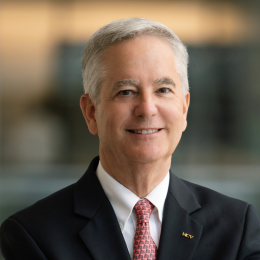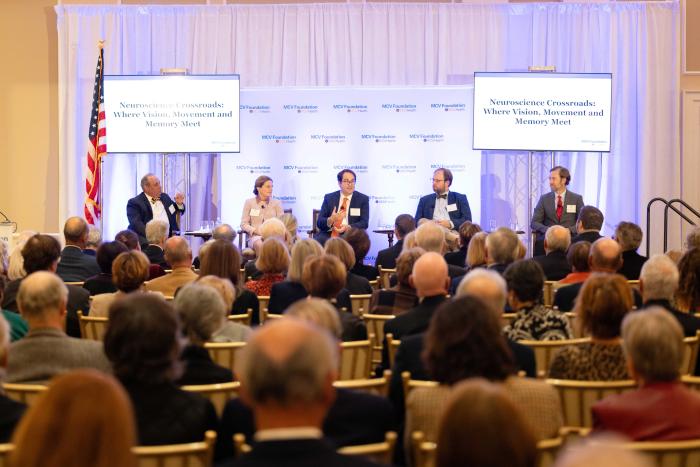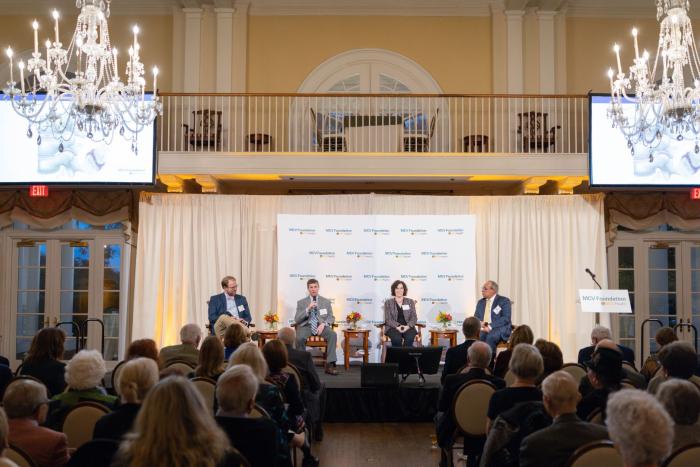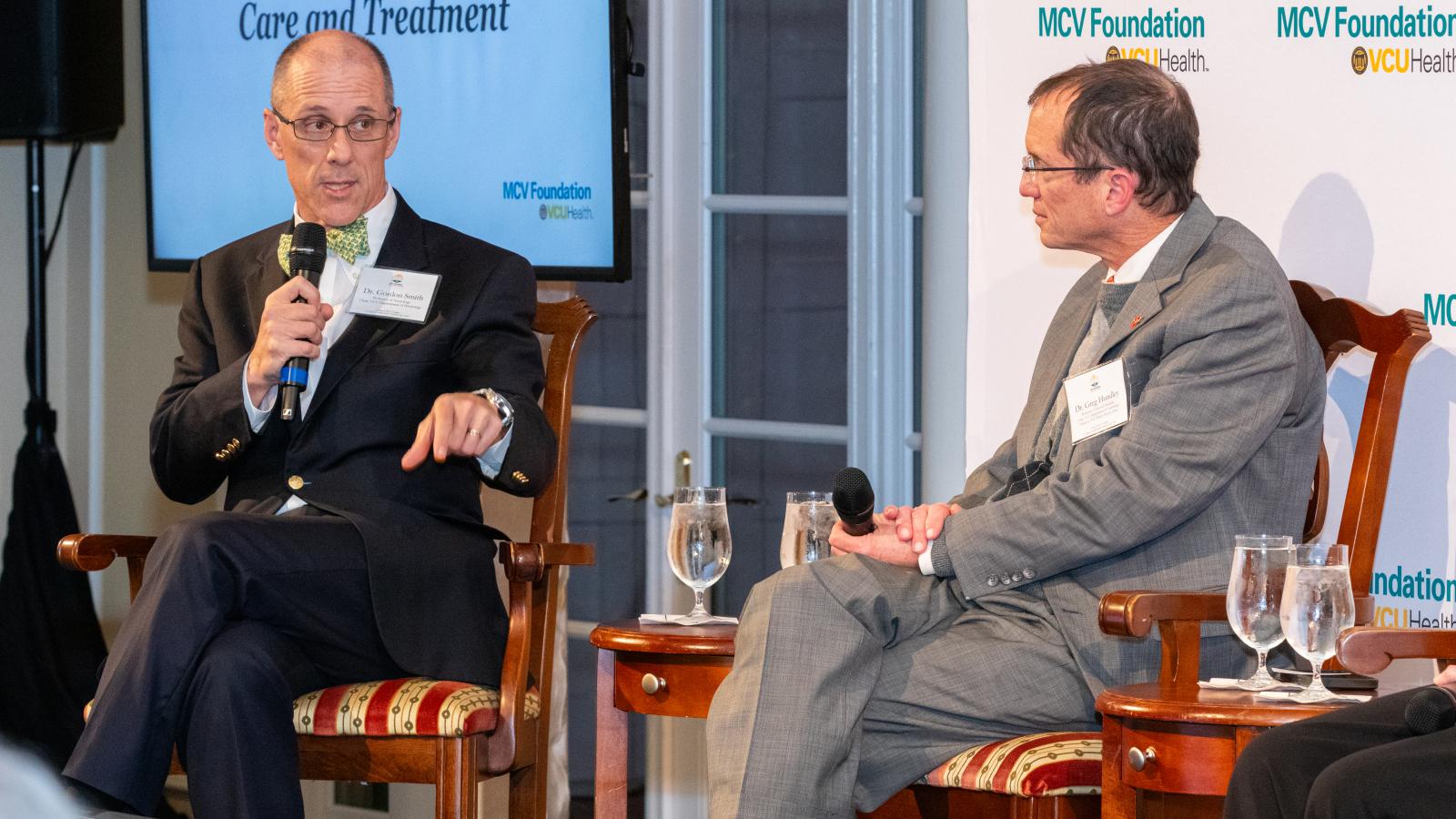
Gordon Smith, M.D., professor and chair of the Department of Neurology at the VCU School of Medicine and Greg Hundley, M.D., director of the VCU Health Pauley Heart Center and chair of the Department of Cardiology, were among the panelists in Richmond and Williamsburg as part of the MCV Foundation’s fall Discovery Series events. Photos: CSI Studios
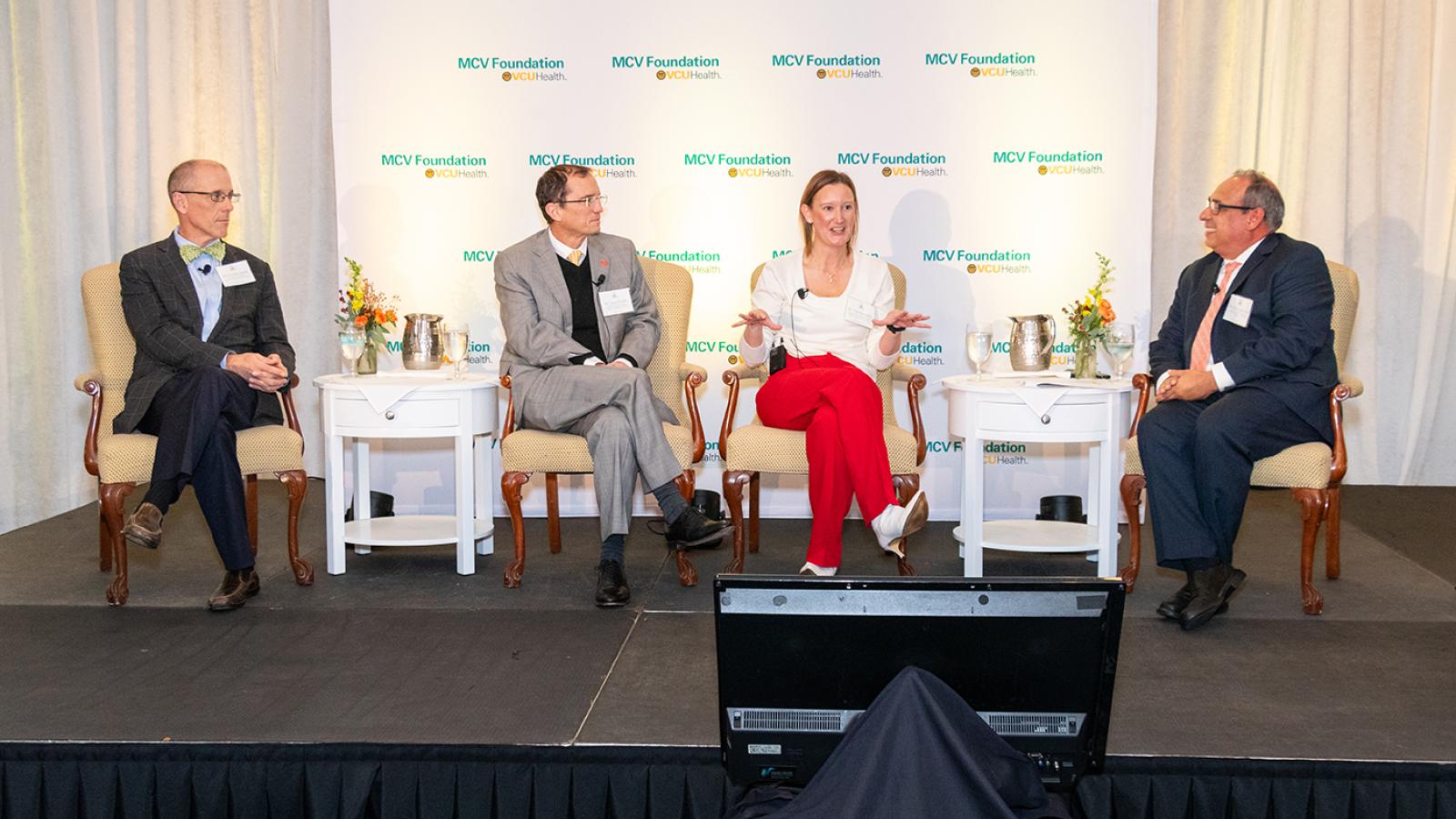
Art Saavedra, M.D., Ph.D., dean of the VCU School of Medicine, moderated panel discussions this November at both Discovery Series events that included Gordon Smith, M.D., professor and chair of the Department of Neurology at the VCU School of Medicine, Victoria Findlay, Ph.D., co-leader of the Cancer Prevention and Control program at VCU Massey Comprehensive Cancer Center, and Greg Hundley, M.D., director of the VCU Health Pauley Heart Center.
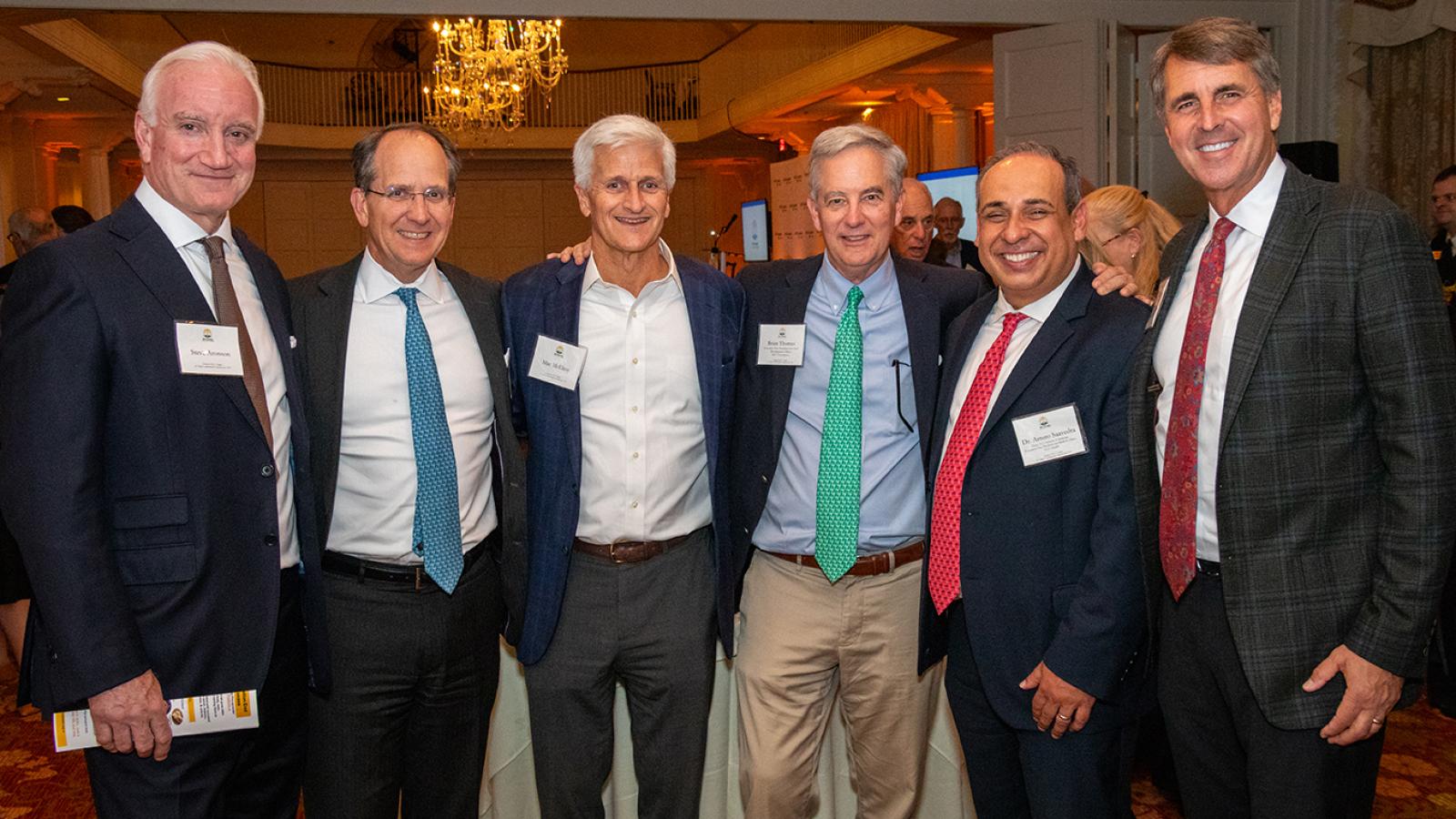
(L to R) Steve Aronson; Wyatt Beazley IV; Mac McElroy; Brian Thomas, executive vice president and chief development officer for the MCV Foundation; Art Saavedra, M.D., Ph.D., dean of the VCU School of Medicine; and David Lyons enjoyed the reception following the Discovery Series event in Richmond.
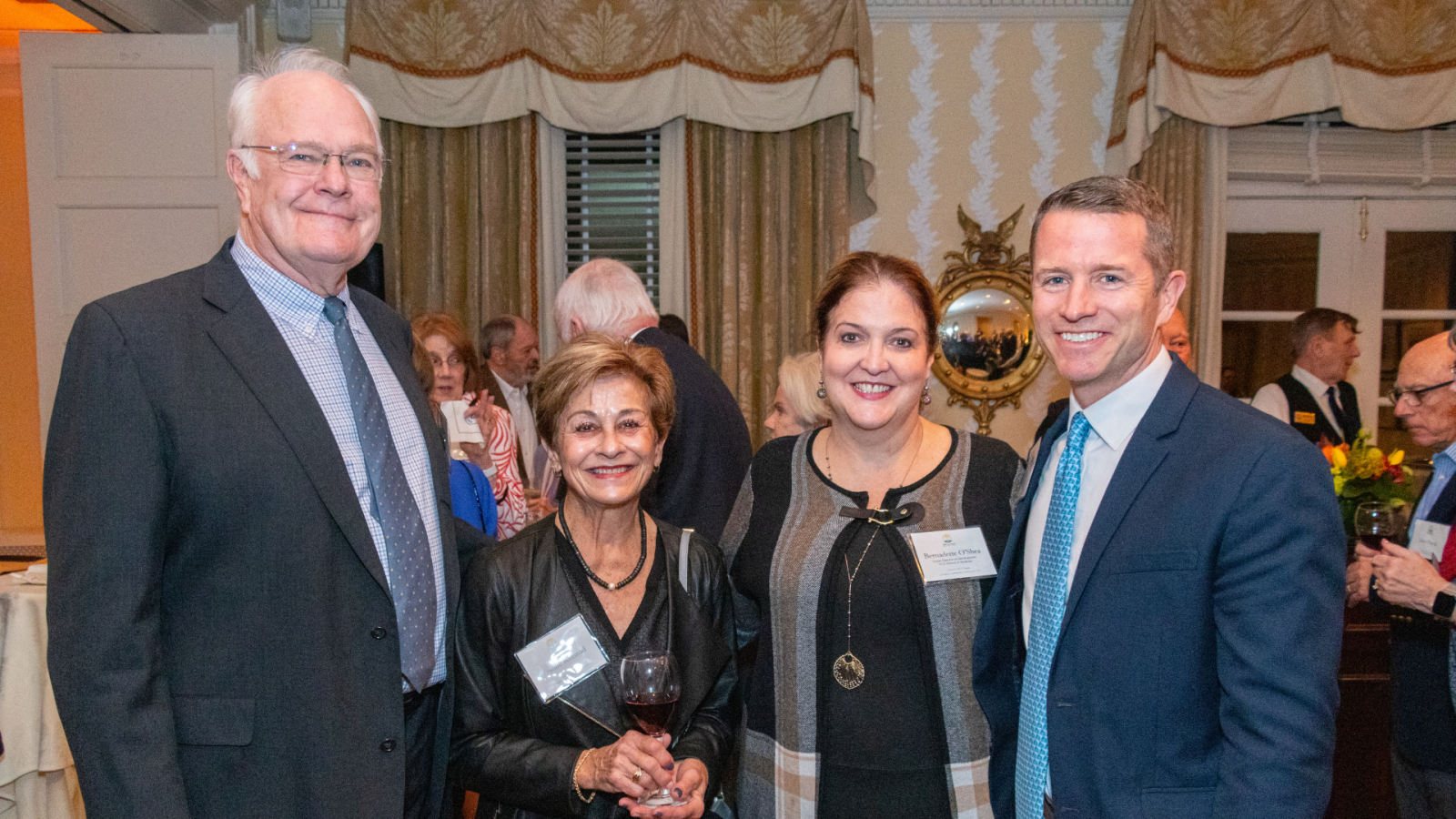
Alex and Leanne Kurland with Bernadette O’Shea, senior director of development for neurosciences, and Niles Eggleston, senior associate vice president for medical philanthropy and alumni relations, during the MCV Foundation’s fall Discovery Series event in Richmond.
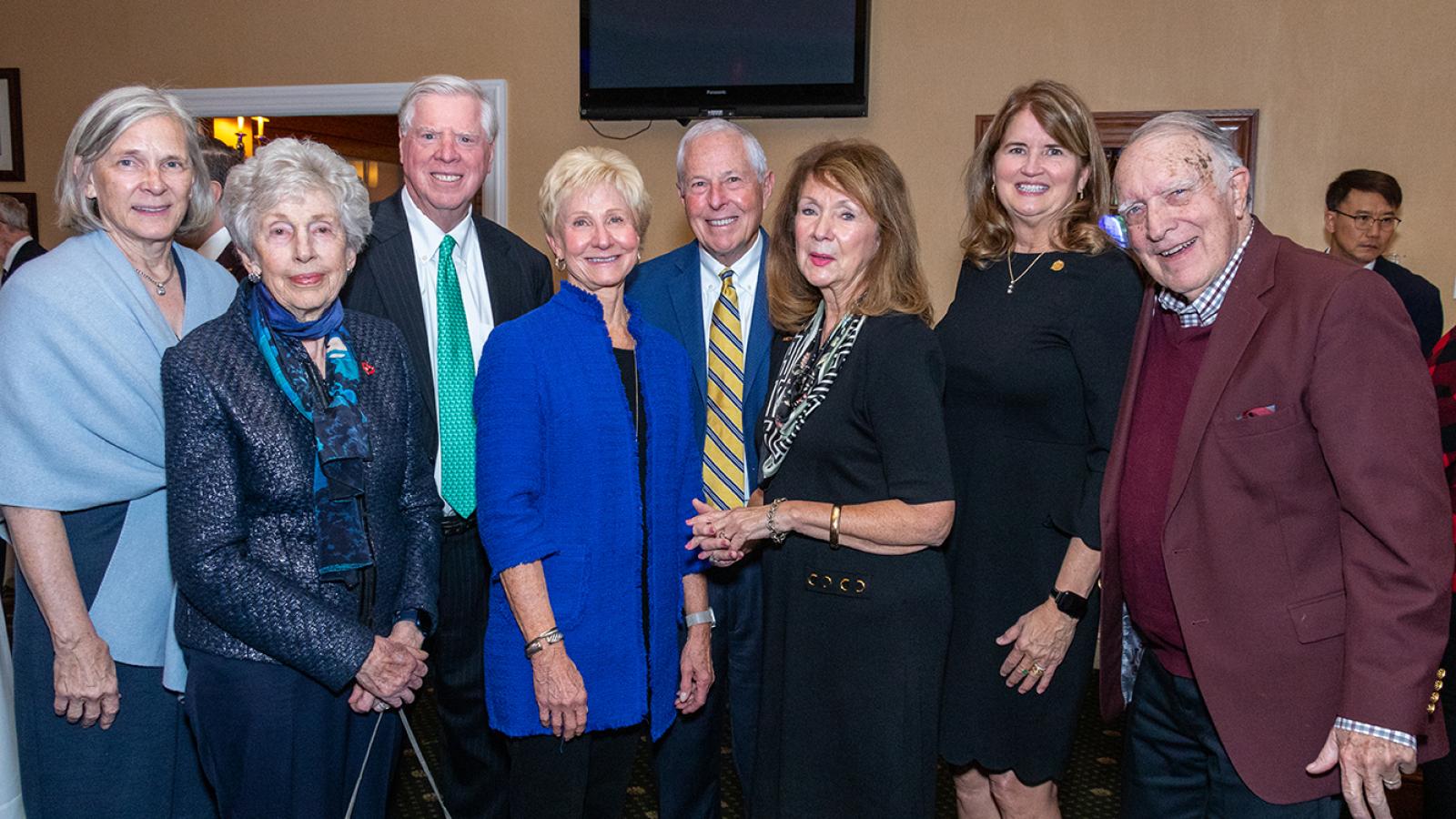
The host committee for the Williamsburg Discovery Series event includes (L to R) Ginny Crone, Jane Kaplan, Charles Crone, Louise and Bob Canfield, Judi Forehand Starkey, Julie Baxter and Paul Dresser.
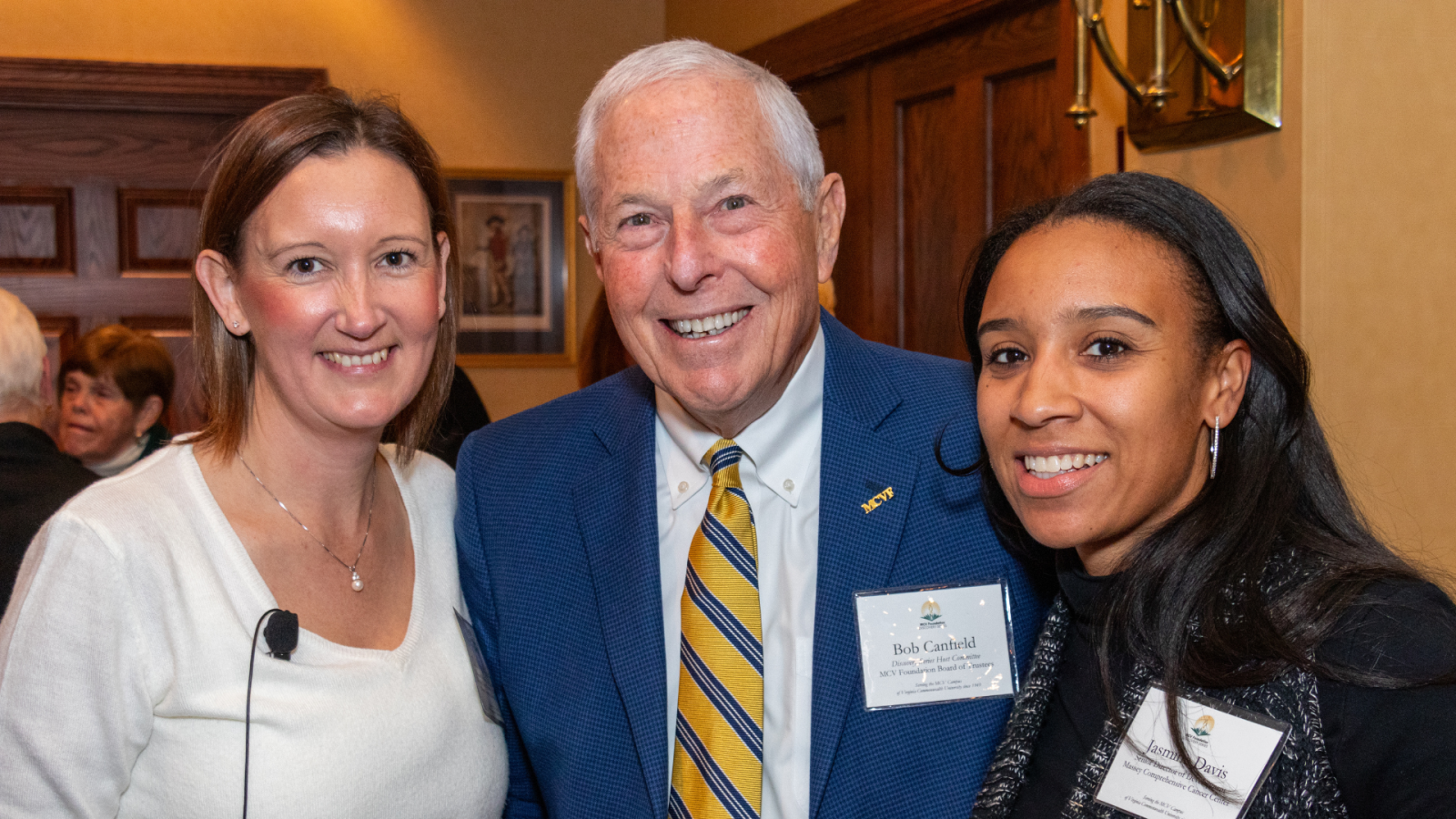
Victoria Findlay, Ph.D., a co-leader of the Cancer Prevention and Control program at VCU Massey Comprehensive Cancer Center, is pictured with Bob Canfield, a Williamsburg host committee member and Jasmine Davis, senior director of development for Massey, at the Discovery Series event Nov. 14 in Williamsburg.
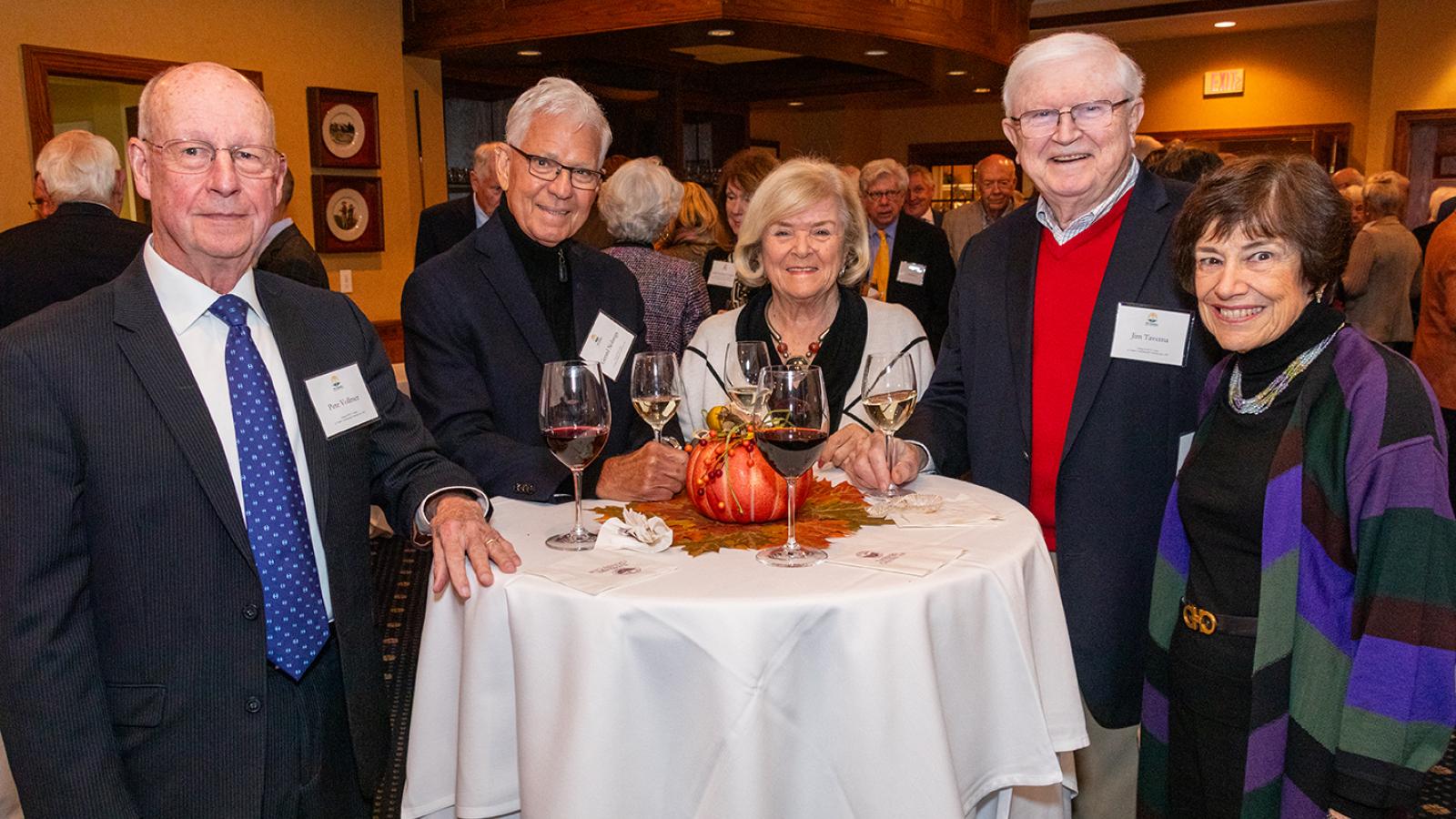
Guests enjoy the reception prior to the MCV Foundation’s fall Discovery Series on Nov. 14 in Williamsburg.
Foundation’s Discovery Series Highlights Innovations in Research and Patient Care
The ties that bind the MCV Campus in Richmond to passionate, advocacy-minded individuals in Williamsburg were on full display earlier this month as the MCV Foundation celebrated the 10th anniversary of its signature Discovery Series.
Nearly 80 people gathered at The Country Club of Virginia in Richmond on Nov. 8, followed by more than 185 on Nov. 14 at Two Rivers Country Club in Williamsburg, to hear from renowned VCU Health physicians and researchers on a variety of topics. In the fall of 2013, the foundation established the Discovery Series in Williamsburg as an outreach program aimed at raising awareness of the outstanding medical research, care and education that happens every day on the MCV Campus. In 2019, the series expanded to include a Richmond event.
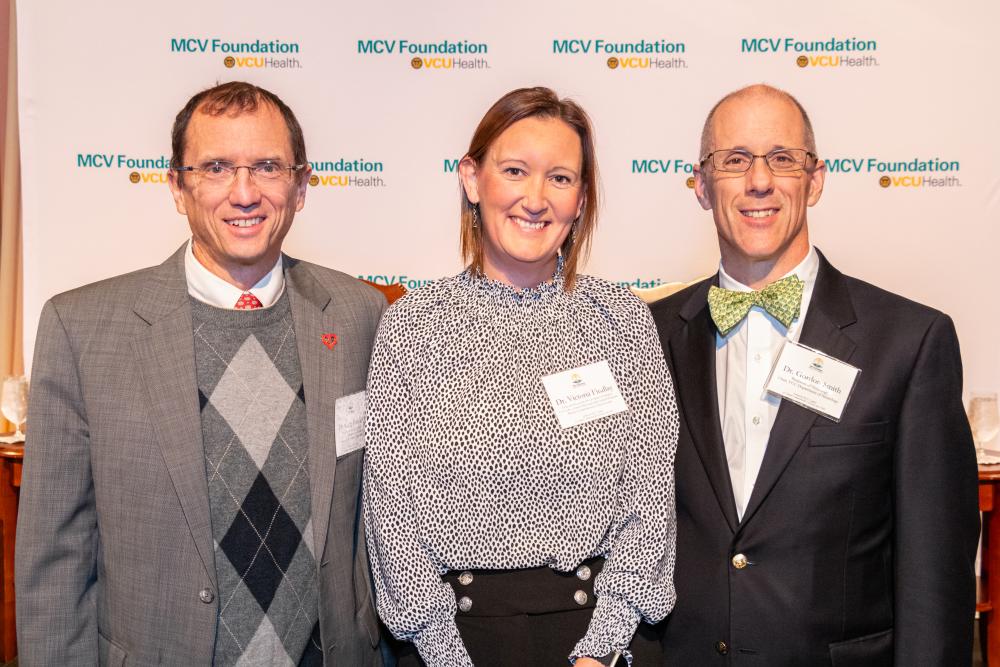
Each event allows attendees to connect with leading VCU Health scholars, researchers and clinicians. They feature panel discussions and opportunities for guests to have informal conversations with presenters about the latest medical advances. The popularity of the Discovery Series led to the formation of the Discovery Society in 2015. The Society honors individuals who give generously to support the MCV Campus. From an inaugural membership of 74, today’s Discover Society boasts nearly 280 members who have collectively given more than $8 million. Society members have become staunch advocates — even clinical trial participants — thanks to these events that bring the latest news and information on medical advancements directly to them. Their work on behalf of the MCV Campus ultimately strengthens the overall health system and provides support that directly benefits and expands VCU Health’s impact beyond Richmond.
This fall’s events were called Innovation, Research, Patient Care and Treatment, and they featured three panelists: Victoria Findlay, Ph.D., co-leader of the Cancer Prevention and Control program at VCU Massey Comprehensive Cancer Center; Greg Hundley, M.D., chair of the Department of Cardiology and director of the VCU Health Pauley Heart Center; and Gordon Smith, M.D., professor and chair of the Department of Neurology at the VCU School of Medicine.
From meetings like this, we’re able to spawn ideas and move forward together to make things happen.
Greg Hundley, M.D., director of the VCU Health Pauley Heart Center
Art Saavedra, M.D., Ph.D., dean of the VCU School of Medicine, moderated the panel discussions, which shared exciting insights on a wealth of information, from innovative research happening in the area of neuropathy, to the expansion of cardiovascular care services in Williamsburg. Further, attendees heard about advancements and breakthroughs in a little-known area of study that examines the connection between food and risks of various cancers.
**
Several years ago, cardiovascular care in Williamsburg was an area where VCU Health struggled, explained Dr. Hundley, because the services needed to provide excellent cardiovascular care are complex. Beyond routine health exams, patients often need a variety of tests to reach clearer diagnoses, including stress tests, electrocardiograms and more.
Williamsburg residents and supporters rallied, Dr. Hundley said. They raised money for much-needed diagnostic equipment to outfit an advanced cardiology in Williamsburg, as well as the funds needed to hire top cardiologists and staff to run the clinic, which will oversee a variety of specialized services, from cardiovascular oncology and electrophysiology to sports medicine cardiovascular care and advanced heart failure.
Additionally, ideas emerged about local partnerships with William & Mary to offer undergraduate students opportunities to participate in VCU Health medical assistant or medical research programs.
“From meetings like this,” Dr. Hundley said, gesturing to the crowded room, “we’re able to spawn ideas and move forward together to make things happen.”
**
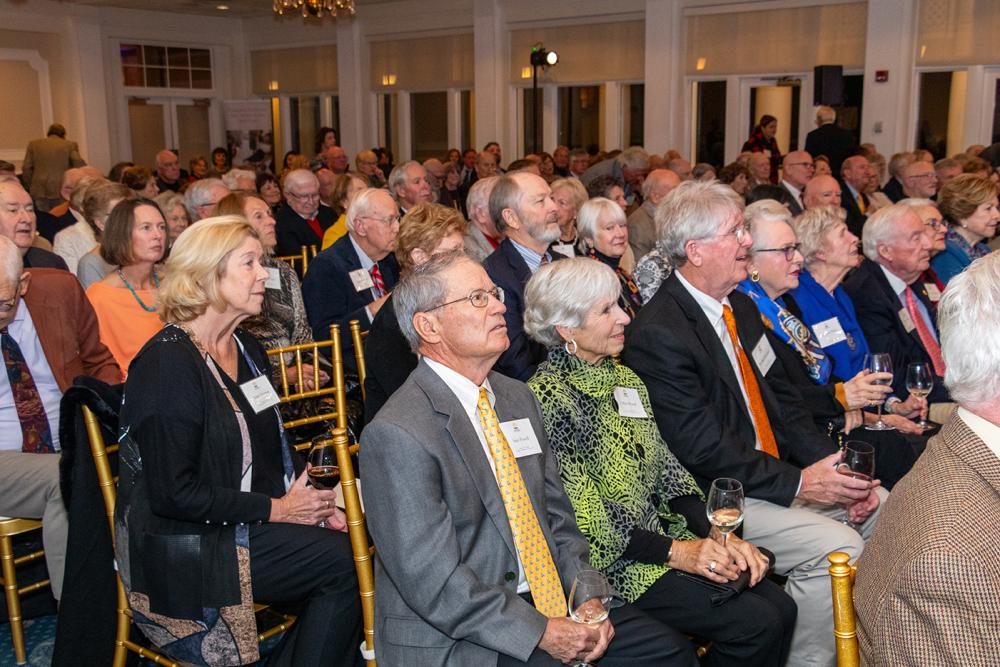
Dr. Smith asked audience members if anyone had had shingles, a viral infection that affects many people and is caused by the same virus as chicken pox. Shingles causes painful skin rashes and blisters, and the question segued into a discussion about how VCU Health physicians and researchers are tackling viruses related to shingles as they develop prevention and treatment for peripheral neuropathies.
Peripheral neuropathy refers to nerve damage that occurs outside of the brain and spinal cord. It causes a variety of symptoms, from numbness and tingling to pain, and affects the body’s extremities, from toes and feet to fingers, hands and arms.
Dr. Smith explained that viruses like shingles target nerve cells. He and others, however, are researching therapies that would zero in on specific nerve cells to prevent viruses from replicating or damaging those cells. Dr. Smith said he and a team of collaborators are working to develop a clinical trial that could take place within a year or two.
“Think of it as a smart bomb versus a nuclear bomb,” he said about those targeted therapies. “The idea is to focus on people who are starting to develop neuropathy in the hopes of preventing further damage. If these therapies are successful, they could be applied to other diseases that trigger neuropathy, such as diabetes.”
**
The discussion was light-hearted, but its underlying message offered some important insights to digest.
We want to offer advice and education to help you reduce the AGEs that you eat so you can maintain a healthy lifestyle.
Victoria Findlay, Ph.D., co-leader of the Cancer Prevention and Control program at VCU Massey Comprehensive Cancer Center
Dr. Findlay introduced the audience to her research into AGEs, or advanced glycation end products, which are harmful compounds found in food that become worse when exposed to high temperatures during cooking. Too many of these compounds in the body can trigger health issues like diabetes, inflammation, and more, as well as premature aging. She is also researching their impact on cancer risks.
“Everything we’re exposed to in our life leads to the metabolism that ages our body, and that accelerates as we grow older,” Dr. Findlay said about her area of research, “We’re trying to slow that down.”
She shared examples. The average daily recommended quantity of AGEs is roughly 15,000 units. A raw carrot, she said, offers two units, and when it is roasted, those AGEs increase to about eight. A 3-ounce portion of raw chicken, however, has roughly 600 units, she said, but when it is grilled or fried, that number hits upward of 8,000.
Her most extreme example — three slices of bacon — equaled about 97,000 units, eliciting both groans and laughter from the audience.
“We used to eat what we grew in our backyard,” she said, but lifestyles today now include more convenience foods than ever. Her research aims to help educate the public on the perils and health risks associated with unhealthy diets, as well as offer ways to reduce AGEs in foods. She offered a food prep tip that is being studied now that seems to reduce AGEs in food: using acids like lemon juice to marinate foods.
“We go to the grocery store, where 70% of the foods available to us are ultra-processed or processed in some way, and our bodies don’t know how to deal with that,” she said. “We want to offer advice and education to help you reduce the AGEs that you eat so you can maintain a healthy lifestyle.”
**
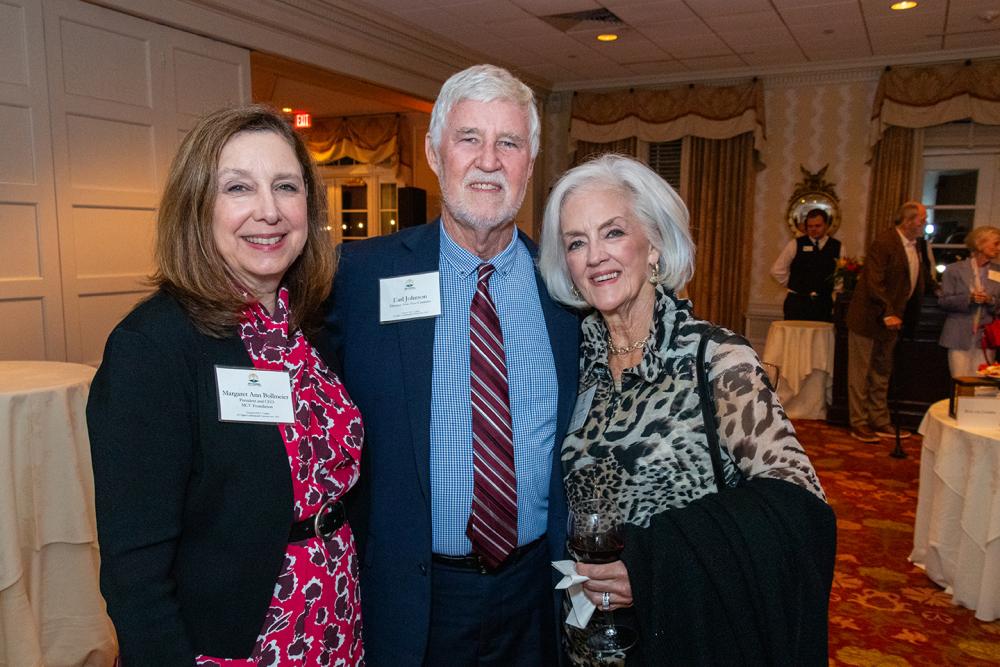
Discovery Series events are made possible, in large part, by volunteer host committees who help shape the program themes and connect the event to the community.
In Williamsburg, the committee includes Julie Baxter and Paul Dresser, Louise and Bob Canfield, Ginny and Charles Crone, Jane Kaplan, and Judi Forehand Starkey. In Richmond, the host committee is comprised of Tenley and Wyatt Beazley, Maura and Mike Bisceglia, Anne and Roger Boevé, Susan and Steve Gaidos, Gail and Earl Johnson, Patricia and David Lyons, Becky Purdue, and Judi and Jim Starkey.
If you are interested in learning more about the MCV Foundation’s Discovery Series, please contact Brian Thomas, executive vice president and chief development officer.
